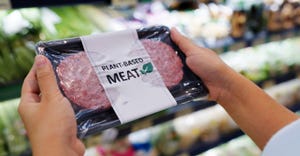Food plays a critical role in determining one's health. How food is produced is equally as important—especially to the planet.

This is the first article in a series co-authored by Udi Lazimy and T. Callahan, which will explore fundamental facets of the modern food system, ranging from diet and nutrition, sourcing and supply chains, to the intersection of food and climate.
Food plays a critical role in determining one's health. How food is produced is equally as important—especially to the planet. What the modern food system needs most is a healthy dose of integrity.
Few would argue that integrity is at the heart of any major industry. Things are changing, however, especially when it comes to the food system. Consumers are demanding more transparency as to where their food comes from and how it is grown.
According to Mintel’s 2023 Global Food and Drink Trends report, “consumers will gravitate towards brands that highlight how products align with their top priorities” this year. While integrity may not prove a foolproof guide, it hinges along two important axes: Transparency and honesty. And if there is any hope of addressing the many crises facing the planet today—food sovereignty amongst them—integrity will prove one of the greatest levers of change.
Consumers drive change
Developing a food system rooted in integrity will demand cooperation between producers and consumers alike. Of those polled by Mintel, more than half (53%) of U.S. adults are worried about the future. That figure jumps to 78% for Gen Z.
The report also suggests brands leverage “the stars above as a dream destination, casting space as a symbol of hope, positivity, and global cooperation for marketers to revere.” Before looking for a planet B, though, the soil already present offers immense potential to begin building a regenerative future now.
Consumers are also seeking out brands that are transparent, per the report: “A quest for trustworthy information will lead consumers to appreciate brands that support their claims … messaging benefits that are of interest to consumers, such as product versatility and environmental or ethical claims.”
Abrupt change, however, is rarely welcomed by the status quo. Perhaps this is one reason doubt continues to be cast on those on the cutting edge of food in areas like alt-protein or cultured meat.
Now-considered behemoths in the plant-based meat sector like Beyond Meat and Impossible Foods were punchlines only a few years ago. Though there has been a lot of hesitancy from industry and consumers on these products, research shows otherwise. According to the U.N. Intergovernmental Panel on Climate Change's (IPCC) report, “a shift in consumption towards a broadly healthier diet [could] decrease [greenhouse gas] GHG emissions from food production by 11% [and] decrease GHG emissions from landfills by 20%,” amongst other tangible ecological benefits.
Change is going to come
It’s no longer a question of if things will change but how. In light of a more nuanced understanding of the ecological impacts of how and where food is sourced, consideration must be extended to the lifespan of Earth. Eating fewer animal products is one substantive change consumers can make.
The industrialized food system as it stands is antithetical to facilitating a more harmonious future. Industrial animal agriculture is fueled in large part by heavily processed commodity feed crops. In the Amazon, 80% of deforestation is done in service of grazing cheaper cattle.
Just as a diverse diet of whole foods provides a dynamic landscape of nutrients, so too does the planet thrive with abundant biodiversity. Consuming more plants directly (processed or not) is one such avenue proven to significantly reduce impact on the planet while feeding the world’s growing population.
Equipping the masses with the means to eat with integrity is a noble pursuit. How people choose to do so will leave an enduring legacy.
With over 20 years leading sustainable food system policy and innovation at companies and organizations like Eat Just, National Sustainable Agriculture Coalition, Beyond Meat, Organic Farming Research Foundation, Patagonia and others, Lazimy and Callahan hope to encourage new approaches to the challenges that face the U.S. food system with an emphasis on the burgeoning plant-based industry.
About the Author(s)
You May Also Like






